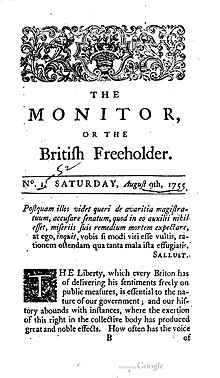|
The Monitor: Or, British Freeholder
 The Monitor: Or, British Freeholder was a periodical published in England from 1755 to 1765.[1] Richard Beckford, a brother of William Beckford, supported the publication financially;[1] Peters argues that he did so in order to shore up support for the Beckfords' political faction.[2] The Beckfords supported Pitt the Elder, and accordingly so did the Monitor.[2] It exclusively published essays and opinion pieces.[2] In this respect, Peters compares it to The North Briton.[2] D. Nichol Smith argues that it was founded "with the purpose of emancipating the King from an arbitrary administration and exposing the arts by which Ministers encroach on the power of the people".[3] A scathing review of a 1759 issue of the Monitor in The Critical Review noted, evidently alluding to the Monitor's controversialist style:
Monitor staff included Arthur Beardmore and John Entick.[2] The latter was the plaintiff in Entick v Carrington, a landmark case in the English law of privacy and individual rights. In that case, Entick successfully sued agents of George Montagu-Dunk, 2nd Earl of Halifax, who entered his home to search for allegedly seditious papers published in the Monitor.[5] References
Sources
Information related to The Monitor: Or, British Freeholder |